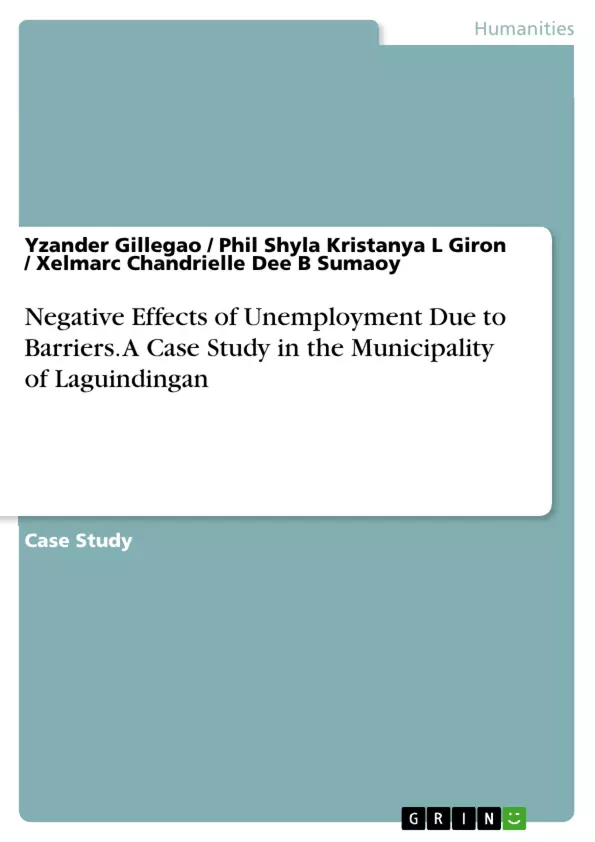Unemployment has become an existing macroeconomic problem for developing and even developed countries. Despite the efforts of the government to lessen the rate of unemployment, the problem still exists and it negatively affects the unemployed population. In this paper, common employment barriers in Laguindingan (a municipality in the province of Misamis Oriental, Philippines) and its corresponding negative financially, socially, and psychologically effects are researched. Interviews with fifty unemployed individuals were conducted and the findings are presented descriptively.
The current national census tells that the Philippine population is at 102,377,484. More than six million individuals of this estimate or about 6.1 percent are unemployed; in the province of Misamis Oriental, around 5.6 percent of the population are presently unemployed. For the past five years, the unemployment rate has significantly changed; however, changes are noticeably fluctuating. This paper seeks to determine the most common employment barriers and their corresponding negative effects to individuals residing in the municipality of Laguindingan which is an emerging town in terms of business, tourism, and the likes; the researchers find it considerable to conduct a study on unemployment for future assessment and use in making the town more productive.
Frequently Asked Questions: Negative Effects of Unemployment due to Barriers
What is the main focus of this research?
This research aims to determine the common employment barriers in the Municipality of Laguindingan and their corresponding negative effects financially, socially, and psychologically on the unemployed population.
What are the common employment barriers identified in the study?
The study focuses on several employment barriers, including early parenthood, a limited number of job vacancies, lack of employment history, high skill requirements, insufficient educational attainment, and job refusal due to low salary or distance.
How does early parenthood act as an employment barrier?
The study found that early parenthood, particularly among women with lower educational attainment, significantly hinders employment opportunities due to childcare responsibilities. This barrier limits their ability to seek or maintain employment.
What role does parent dependency play in the unemployment of single individuals?
Some single individuals depend financially on their parents, reducing their need to actively seek employment. However, this dependency can also be a barrier to gaining job experience and financial independence.
How does the lack of job vacancies contribute to unemployment?
A significant number of respondents indicated that the limited number of job vacancies and intense competition from other applicants make it difficult to secure employment. This is exacerbated by economic cycles and firms reducing hiring during recessions.
Why is employment history a barrier for some job seekers?
Many employers require prior work experience, making it difficult for fresh graduates or individuals re-entering the workforce to find jobs. This creates a cycle where a lack of initial experience prevents them from gaining future employment.
How do skill mismatches impact unemployment?
Many unemployed individuals find that their skills do not match the requirements of available jobs, leading to structural unemployment. This mismatch may be due to inadequate training or choosing the wrong educational path.
How does low educational attainment contribute to unemployment?
Respondents with lower educational levels (high school or less) face difficulty securing employment due to many jobs requiring a college degree. They are often limited to temporary or low-paying jobs, making it difficult to achieve long-term financial stability.
What are the negative financial effects of unemployment according to the research?
Unemployment leads to food insecurity, difficulties in providing adequate schooling for children, and reduced access to quality housing and healthcare. Many families rely on debts to cover basic needs, leading to a cycle of financial instability.
How does unemployment affect social connections?
Unemployment often leads to social isolation as individuals spend more time at home due to a lack of financial resources. This can result in fewer interactions with friends and a decline in social networks.
How does unemployment influence family and friend relationships?
Unemployment can strain relationships with friends due to reduced social activities and a sense of isolation. While family relationships are generally less affected, financial stress and the development of vices can sometimes cause misunderstandings.
Does unemployment contribute to the development of vices?
Some unemployed individuals turn to vices such as drinking and smoking as a way to cope with stress and boredom. This can be influenced by peers who are also unemployed and struggling with similar issues.
What are the negative psychological effects of unemployment?
Unemployment can lead to feelings of stress, sadness, and worry about the future. While some individuals maintain a positive outlook and believe they can still find employment, others lose faith in their ability to secure a job and become less satisfied with their lives.
What are the report's conclusions regarding unemployment in the Municipality of Laguindingan?
The report concludes that addressing unemployment in the Municipality of Laguindingan requires interventions focused on education, skills training, and family planning. Reducing barriers such as early parenthood, skills mismatches, and lack of access to education can improve employment opportunities and reduce the negative financial, social, and psychological effects of unemployment.
- Arbeit zitieren
- Yzander Gillegao (Autor:in), Phil Shyla Kristanya L Giron (Autor:in), Xelmarc Chandrielle Dee B Sumaoy (Autor:in), 2016, Negative Effects of Unemployment Due to Barriers. A Case Study in the Municipality of Laguindingan, München, GRIN Verlag, https://www.grin.com/document/376484



